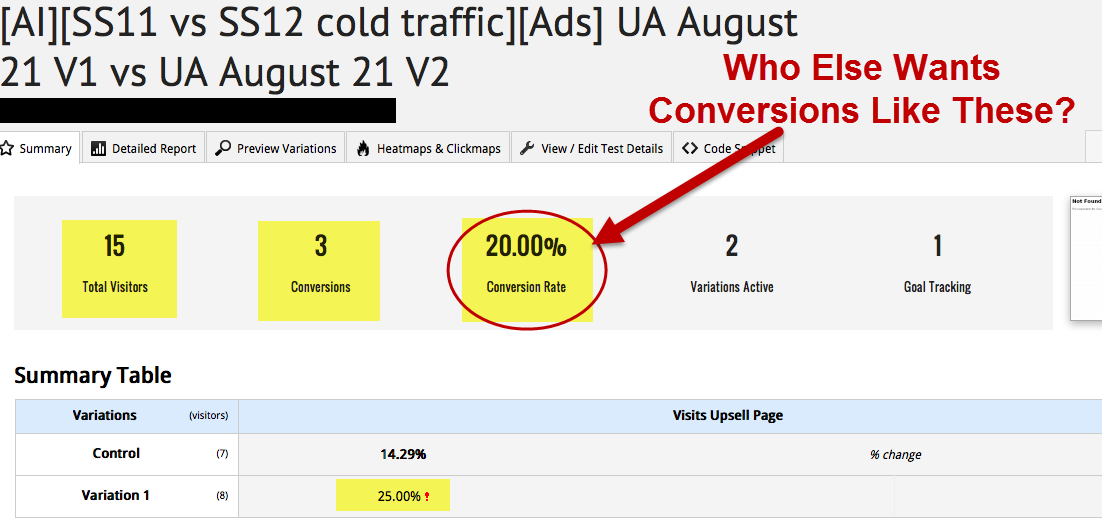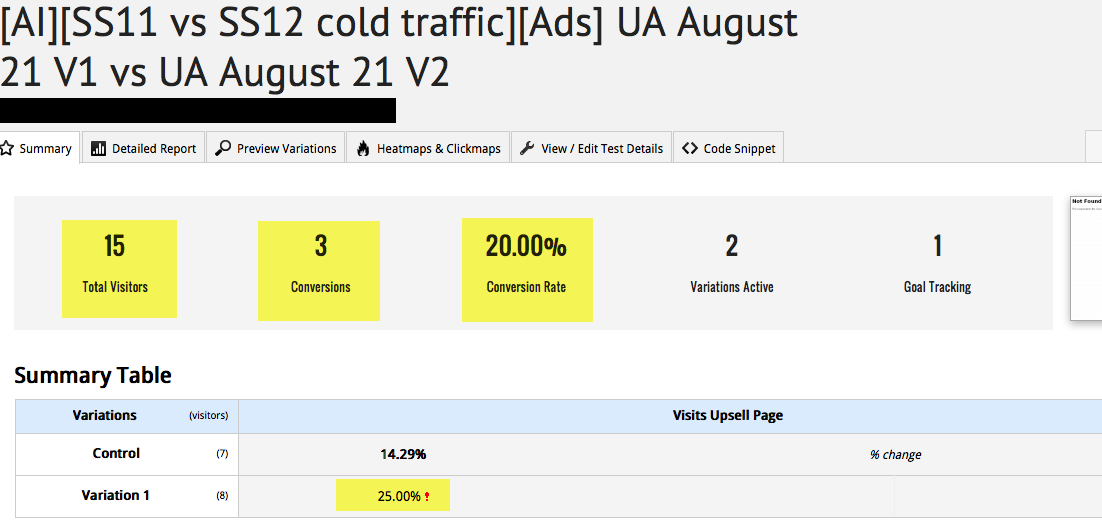The title of this blog post sounds rather self-righteous and cocky, doesn’t it?
It’s not meant to be. As you read this blog, understand I have nothing to sell you today.
All I’m trying to do is prove a point. Show you how I do it. And along the way, give you a little inspiration and a few solid ideas to help you grow your business or become a better copywriter.
Can’t fault me for trying, right? 🙂
So let me state that point right now…
When you thoroughly understand your market, online conversions shoot through the roof. You DOMINATE.
Here’s my story…
Currently, I’m a part of three marketing teams where I’m the copywriter. All marketing is on Facebook. All supposedly doing things “the old fashioned way.” In other words, driving paid traffic directly to long-winded 25-minute PowerPoint sales videos.
And implicitly, that means…
- No warming up the prospect first…
- No article landers pre-selling, teaching and educating visitors how valuable our offer will be…
- No optin lead generation or email marketing…
- No socializing or engaging on social media…
- No content marketing…
All the things you’re SUPPOSED to be doing today marketing-wise are off limits on these projects.
Why? Because, not to be shortsighted, my clients just want to… SELL.
Yeah, I know. Marketing blasphemy.
On Facebook specifically, you’re supposed to build a community… a tribe… create a culture… before you earn the right to sell. Yeah, I know how important can be, but it still doesn’t matter.
Heck, I don’t even get the benefit of a fan page on one of the projects.
I’ve tried to tell clients, but it’s not something they want to hear right now. Maybe someday, but not now.
Here’s their justification: Clients want to spend their time, money and energy working with real customers and buyers. Not freebie seekers who just want to socialize and share pictures of cats.
You can’t blame them. The clients aren’t info-marketers. They have no desire to be famous, or a personality or a guru, or even brand themselves.
You want to know what else I’m up against? The price points are stiff for these online frontend offers. As high as $147. Conventional wisdom dictates these should be under$47.
To make matters worse, I don’t even get the benefit of being able to auto-start the video. Why? Because the traffic’s coming from Facebook. And that means the majority of traffic is MOBILE. And unfortunately for marketers like you and me, mobile devices don’t allow auto-start.
(If you’re one of those people that doesn’t like long winded, auto-start, PowerPoint videos, you’re probably smiling right about now. 🙂 )
And after having to deal with all that, mobile traffic is incredibly difficult to convert compared to desktop visitors.
Not to mention the traffic can be expensive.
So right there as a
copywriter, the pressure is on.
The videos have to convert. Or I’m outta luck. I’ve got one shot at converting the traffic and they’re gone. Feels like I’m marketing with one hand tied behind my back.
But honestly, I’m not intimidated or worried. Here let me show you what’s possible:
Take a look at the highlighted numbers.
Yep, that’s right. On one project, we’re getting a 20% conversion rates on average. And as high as 25%. On Facebook, no less.
The market? Personal development. Extremely competitive.
I have other offers in other markets and products equally impressive. Anywhere between 10-25% conversions. Supplements. Health and fitness. Weight loss. Financial. Music lessons. Survival & Prepper.
Of course when I’m not hog tied, and the gloves are off, I can really pull out the big guns.
Imagine how much you can pay for prime, ultra-targeted traffic when you’re getting those kinds of conversions.
You’d have to agree, you can dominate your competition. The numbers go even higher.
Take a moment and study these numbers. Get really clear THIS is what’s possible when YOU do what I’m about to suggest.
How do my teams and I do it?
No, it ISN’T just fancy copywriting pyrotechnics, although I’ll admit there is a fair amount of that. There’s something more fundamental at work which I want to focus on today. More importantly…
I intimately understand
the markets we compete in.
Now to be 100% forthcoming, when I start these projects, I usually don’t know the market as much as I would like.
I don’t know what prospects really want. I don’t know what emotions drive them to buy. I don’t what know their concerns and challenges are. I don’t know how to speak to them.
I feel I’m at a disadvantage. I feel I have to learn. And learn fast.
Unfortunately, when it comes to knowing market, my clients usually aren’t that much better off. The market is constantly in flux. What worked yesterday, doesn’t necessarily work today.
The truth is on that personal development project I showed you we failed initially. For months, we flirted around break even profitability. But just couldn’t crack the code.
But we didn’t stop. We didn’t give up.
We got even more curious. We doubled and tripled our resolve. About the market wants and what drives it.
Sometimes, it feels like an obsession to me.
You see, when the bulk of your compensation as a copywriter is based upon performance like mine is, you have to convert, or you don’t get paid.
So what do I mean “I know our markets?”
I know…
- Their language and I use it to communicate with them.
- I know their buying patterns.
- I know what emotions drive them on a consistent basis.
- I know their predispositions and preferences.
- I know what they fear. I know what they hate.
- I know the things they want to keep secret. As a group, I know I know their inner heart’s desire.
- I know what they’ve bought before.
- I know what websites they’ve visited recently.
In short, I try to know as much as I can about them.
Here, let me give you a quick cheat sheet. When I work on a project, I want to know…
7 Keys to Market Research
I want to know…
- My clients product inside and out (And given what we learn, I want a hand in developing it)
- The direct and indirect competition, including their products and strategies for getting business…
- What are the ideal customer’s emotions as they relate to the product. Both the emotions they want and the emotions they want to avoid.
- The ideal customer’s values and beliefs as they relate to the product (What’s most important to them)…
- Where do they hang out online? Offline?
- The keywords they use to search for a product. Yeah, I want to know how they search Google, as well as other search engines…
- The prospect language and the way they communicate. Do they use lots of jargon?
- Who are their role models? Who do they want to emulate?
- What celebrities do they follow? (Celebrities can often be avatars for how they view or want to view themselves)
- And of course, what are the ideal customer demographics and psychographics?
I can go on, but you get the picture.
These are the types of questions I ask myself. These are the kinds of questions I want answers to.
And that’s how you get high conversions. What you learn will influence everything you write.
Sure, there are other things that help you convert. Website design, navigation, product development, targeted traffic, etc.
But all of these are influenced and guided by what you learn and know about your prospects and customers, their likes and dislikes.
Plus there are other big benefits of knowing your prospect and customer…
- You get more referrals…
- If they’re enrolled into some sort of subscription program or continuity, you can rely on them staying on longer.
- You can count on having less refunds.
One Marketing Research Tool I Use
Right about now, I’d like to share some tools with you. But what will really make the most amount of difference to you is time.
Spend time in the market. Whatever it takes to really appreciate your prospects situation and what they would need your product or service.
Yeah, I know how much time it takes.
So one thing I love to do a lot is attend conferences, tradeshows and seminars. It’s like a deep dive into the mind of a customer. In three focused intense days, you can really appreciate what customers want. What they’re attracted to.
Yeah, I know you can supposedly get “the same information online.”
I can’t. Not the emotional stuff I need to write great copy. Personally, I need to talk to people.
That’s the biggest tip I can give you: Immerse yourself in the market.
So hopefully I’ve achieved my goals with column today.
Let Me Know What You Think…
Go ahead and leave me a comment below. I’d love hearing your ideas on this subject.
As you can tell, it’s something I’m passionate about. Because I’ve learned firsthand, time after time, how much of a difference it can make to a business.
And if you have market research tools yourself, I’d love hearing about those too. Whether you use them or sell them, it’d be something worth sharing.
And if you’re copywriter and you feel like bragging a little about your conversion, have at it. 🙂
PS: If you’re looking for a specific example of market research in action, take a look at https://copyranger.com/how-to-get-copywriting-clients/
1 out 4 people who read that sales letter, buy. Why? Because I intimately know the what copywriters, both newcomers and seasoned veterans, want most.



